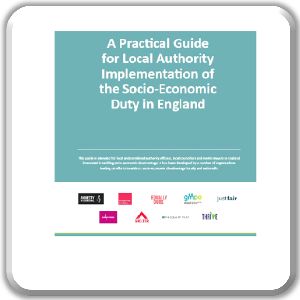By Graham Whitham
At GMPA we are delighted to have published a new guide for local and combined authorities on voluntary adoption and implementation of the socio-economic duty. The guide is for use by organisations across England, including here in Greater Manchester.
We believe the socio-economic duty is a central element of the framework that localities seeking to address poverty should adopt. The duty ensures that local authorities assess the impact of policy and practice on socio-economic disadvantage. Adoption of the duty should be done meaningfully. The guide provides detail and advice on how to ensure that is the case, working closely with people with lived experience of poverty.
There’s a lot of interest in the duty in Greater Manchester following GMPA’s advocacy work on it over the last year or so. Wigan are applying the duty locally, and Salford and Trafford have committed to doing so. The Independent Inequalities Commission recommended adoption of the duty by the Greater Manchester Combined Authority in their recent report.
The scale of socio-economic inequalities in the UK have been highlighted by the pandemic. In spite of this, the UK government continues to choose not to enact the socio-economic duty nationally (the duty is contained in Section 1 of the Equality Act 2010). If enacted, the duty would legally require public authorities to actively consider the way in which their decisions increase or decrease the inequalities that result from socio-economic disadvantage.
As the duty hasn’t been enacted, some areas have taken matters into their own hands. The duty is now in force in Scotland (‘Fairer Scotland Duty’) (and is also being taken forward in Wales), and some combined and local authorities in England are voluntarily implementing it.
The need to formally recognise and address socio-economic disadvantage alongside other forms of inequality has never been more clear, as those from socio-economically disadvantaged backgrounds have experienced some of the most severe health and economic impacts of the pandemic.
We believe that, if implemented, the socio-economic duty would provide a powerful foundation for the fairer society we all want to see. In the absence of action at a national level, we need to identify what we can do locally. Voluntary adoption of the duty can bring a number of benefits including:
- Improving outcomes for local people experiencing socio-economic disadvantage.
- Supporting cross organisational and cross departmental working.
- Raising awareness of socio-economic inequalities within organisations and among partners.
- Ensuring widespread organisational commitment to, and consideration of, socio-economic inequalities.
- Supporting the participation of low-income residents in decisions that affect them, especially in the context of (proposed) cuts to services.
- Achieving greater consistency in practice – and an increased likelihood of maintaining such consistent practice across political administrations and between changes of individual leadership and turnover of staff.
- Improving systematic approaches to equality impact assessments and assessment of policy and practice more broadly.
- Strengthening systematic data gathering and analysis, especially in the conduct of equality impact assessments, thereby strengthening accountability.
- Supporting the effective and efficient allocation of resources.
The guide is broken down into six sections:
- Meaningful impact assessments to understand the consequences of socio-economic disadvantage
- Using data effectively as a tool for decision-making and accountability
- Encouraging strong and visible leadership
- Principles of working in partnership with people with lived experience of socio-economic disadvantage
- Engaging with residents, civil society, and voluntary and community sector organisations
- Ensuring access to justice, and monitoring impact and compliance
 The Guide has been developed by GMPA in partnership with Amnesty, Compassion in Politics, Equally Ours, Just Fair, Runnymede, Shelter, The Equality Trust and Thrive Teeside. It is available here.
The Guide has been developed by GMPA in partnership with Amnesty, Compassion in Politics, Equally Ours, Just Fair, Runnymede, Shelter, The Equality Trust and Thrive Teeside. It is available here.
Please get in touch if you’d like to know more.
Graham Whitham, CEO GMPA





